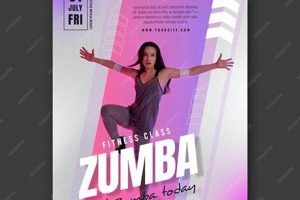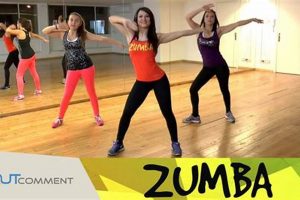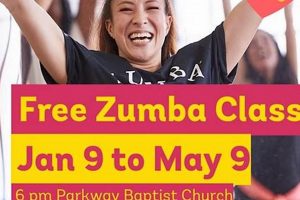Zumba sessions offered without cost in the Seattle metropolitan area provide opportunities for individuals to participate in a dance fitness program without incurring financial expenses. These sessions, often held in community centers, parks, or sponsored by local organizations, aim to promote physical activity and community engagement. For example, a community center might offer a weekly Zumba session as part of its free fitness program.
Accessing dance fitness activities without financial burden offers numerous advantages. It removes a significant barrier to entry for individuals with limited resources, fostering inclusivity and promoting health equity. Historically, such programs have been instrumental in increasing participation in physical activity, improving cardiovascular health, and fostering a sense of community among participants. Organizations often provide these opportunities as a public service to enhance the well-being of their local population.
The following sections will explore various aspects related to accessing these no-cost fitness opportunities within Seattle, including locations, schedules, and potential limitations. This article also aims to provide information on how to identify reliable sources for locating upcoming sessions and alternatives to ensure continued access to dance fitness activities.
Locating Complimentary Dance Fitness Opportunities in Seattle
This section provides practical guidance on how to effectively find and participate in dance fitness programs offered without charge in the Seattle area.
Tip 1: Utilize Seattle Parks and Recreation Resources: Seattle Parks and Recreation frequently offers free fitness classes, including dance fitness. Consult their official website or community center schedules for program listings.
Tip 2: Explore Community Centers and Neighborhood Associations: Many community centers and neighborhood associations provide free or low-cost activities. Contact local organizations to inquire about their fitness schedules.
Tip 3: Check Local Event Calendars and Listings: Websites dedicated to Seattle events and activities often feature announcements for complimentary fitness sessions. Regularly review these calendars for updates.
Tip 4: Leverage Social Media and Online Forums: Search social media platforms and online forums for relevant groups or pages that share information about free community events, including fitness programs.
Tip 5: Inquire at Local Fitness Studios: Some fitness studios may offer occasional introductory dance fitness sessions at no cost to attract new clients. Contact studios in the area to inquire about such promotions.
Tip 6: Consider Outdoor Fitness Events: Public parks and outdoor spaces sometimes host free fitness events during warmer months. Keep an eye out for announcements regarding these outdoor opportunities.
Tip 7: Verify Session Details and Registration Requirements: Always confirm session schedules, locations, and any required pre-registration before attending. Programs may have limited capacity or specific eligibility criteria.
By implementing these strategies, individuals can increase their likelihood of finding and participating in no-cost dance fitness programs, promoting health and wellness within the Seattle community.
The following section will address potential challenges in accessing these sessions and offer alternatives for maintaining a consistent dance fitness regimen.
1. Accessibility
The availability of cost-free Zumba sessions within Seattle directly correlates with increased accessibility to physical fitness opportunities for a wider demographic. The financial barrier to entry, often a significant impediment for lower-income individuals and families, is eliminated. Consequently, participation expands to include those who might otherwise be excluded from paid fitness programs. For example, residents of economically disadvantaged neighborhoods might experience improved access to exercise due to no-cost Zumba classes offered at local community centers. This increase in accessibility positively influences public health outcomes by promoting physical activity and reducing health disparities.
Furthermore, logistical considerations impacting accessibility extend beyond monetary factors. Strategic placement of free classes within easily reachable community spaces, such as parks and recreation centers accessible via public transportation, enhances convenience. Convenient scheduling, with classes offered at various times throughout the day and week, also caters to the diverse work and family commitments of Seattle residents. These considerations directly address common barriers to participation, such as time constraints and transportation difficulties. A practical manifestation of this approach is seen in Seattle’s community initiatives that provide free childcare during certain fitness programs, further enabling participation for parents and caregivers.
In conclusion, accessibility is a critical determinant of the success and impact of complimentary Zumba sessions in Seattle. Its influence extends beyond mere availability; it encompasses considerations of financial constraints, geographical proximity, scheduling flexibility, and the availability of supportive resources. Addressing these multifaceted elements of accessibility is paramount to maximizing the potential benefits of free fitness programs and fostering a healthier, more equitable Seattle community. The long-term sustainability of such initiatives depends on consistent evaluation and adaptation to meet the evolving needs of the population they serve.
2. Community
The concept of “Community” is intrinsically linked to accessible dance fitness programs within Seattle. These no-cost Zumba sessions act as catalysts for social cohesion and collective well-being, extending benefits far beyond individual physical health.
- Social Interaction and Bonding
Free Zumba sessions provide structured opportunities for social interaction among residents who may not otherwise connect. Participants from diverse backgrounds engage in a shared activity, fostering a sense of camaraderie and belonging. For instance, a program in a multicultural neighborhood can unite individuals through music and movement, breaking down social barriers and promoting understanding. This enhanced social connection contributes to reduced feelings of isolation and improved mental well-being.
- Community Health Promotion
These programs serve as a vehicle for disseminating health information and promoting healthy lifestyle choices within the community. Instructors and organizers can incorporate educational components into the sessions, addressing topics such as nutrition, stress management, and preventive healthcare. These discussions, often informal and interactive, increase health literacy and encourage participants to adopt healthier behaviors. As a result, the collective health consciousness of the community is raised.
- Building Social Support Networks
Regular attendance at free Zumba classes facilitates the development of social support networks. Participants connect with like-minded individuals who share similar fitness goals and interests. These connections extend beyond the Zumba sessions, providing emotional support and encouragement. This is particularly important for individuals facing challenges such as chronic illness or social isolation. The presence of strong social support networks has been demonstrated to enhance resilience and improve overall quality of life.
- Empowerment and Collective Action
Accessible Zumba programs can empower community members to take control of their health and well-being. The shared experience of participation can foster a sense of collective agency, leading to increased community involvement in health-related initiatives. This may manifest as advocacy for improved access to healthcare services, participation in community health fairs, or the organization of additional fitness programs. This collective action contributes to the creation of a healthier and more empowered community.
The facets outlined above illustrate the integral role of “Community” in the context of Seattle’s free Zumba programs. These sessions not only promote individual physical fitness but also serve as vital catalysts for social interaction, health promotion, social support, and community empowerment, ultimately contributing to a more connected and thriving city. The sustainability and expansion of these programs are crucial for maintaining and enhancing the health and well-being of Seattle’s diverse population.
3. Instructor Expertise
The effectiveness and safety of complimentary Zumba sessions in Seattle are inextricably linked to the qualifications and competencies of the instructors leading these programs. Instructor expertise transcends mere choreography; it encompasses a comprehensive understanding of fitness principles, safety protocols, and inclusive teaching methodologies.
- Certification and Training
Certified Zumba instructors possess specialized training in the Zumba curriculum, ensuring adherence to established techniques and movements. Certification provides a foundational understanding of Zumba’s unique methodology, minimizing the risk of injury and maximizing the fitness benefits for participants. For instance, instructors are trained to modify movements to accommodate varying fitness levels and physical limitations, ensuring inclusivity and safety for all attendees. Without proper certification, the potential for improper form and subsequent injury increases significantly.
- Knowledge of Exercise Physiology and Biomechanics
A competent Zumba instructor possesses a working knowledge of exercise physiology and biomechanics, allowing them to design classes that are both effective and safe. Understanding how the body responds to exercise enables the instructor to structure the workout appropriately, targeting specific muscle groups while minimizing strain. For example, an instructor with this knowledge will be able to effectively cue participants on proper alignment and posture during high-impact movements. This expertise is crucial in preventing injuries and promoting long-term physical well-being.
- Class Management and Motivational Skills
Beyond technical expertise, effective instructors demonstrate proficiency in class management and possess strong motivational skills. They create a supportive and encouraging environment that fosters participation and adherence. For example, instructors who use positive reinforcement, offer modifications for different fitness levels, and promote a non-competitive atmosphere are more likely to retain participants and promote a positive fitness experience. Conversely, instructors who lack effective class management skills may create a chaotic or intimidating environment, discouraging participation and potentially leading to attrition.
- Adaptability and Inclusivity
Expert instructors are able to adapt their teaching style to accommodate diverse populations, considering factors such as age, physical abilities, and cultural backgrounds. They create an inclusive environment where all participants feel welcome and supported. For example, instructors may modify routines to accommodate individuals with mobility limitations or language barriers, ensuring that everyone can participate effectively. This adaptability is particularly important in free Zumba classes, which often attract a diverse range of participants with varying fitness levels and backgrounds.
In summary, instructor expertise is a critical factor in determining the success and impact of free Zumba classes in Seattle. Competent instructors not only deliver effective and safe workouts but also create a supportive and inclusive environment that promotes participation, adherence, and long-term health benefits. The emphasis on proper certification, knowledge of exercise science, class management skills, and adaptability ensures that these complimentary sessions provide a valuable and accessible fitness resource for the community.
4. Scheduling
The strategic planning of class schedules significantly impacts the accessibility and utilization of complimentary Zumba sessions within the Seattle metropolitan area. Optimal scheduling considers a multitude of factors to maximize participation across diverse demographics.
- Time of Day Considerations
Offering sessions at varying times throughout the day caters to individuals with diverse schedules, including those working traditional hours, shift workers, students, and caregivers. Morning, midday, evening, and weekend options expand accessibility. For example, a midday session might appeal to individuals with flexible lunch breaks, while evening sessions cater to those with daytime work commitments. The absence of varied time slots limits participation to individuals with schedule flexibility, thus hindering broader community engagement.
- Frequency and Consistency
Regularly scheduled sessions with consistent days and times foster routine participation and adherence. Predictable schedules allow individuals to plan their fitness activities in advance, promoting long-term engagement. Sporadic or infrequent offerings reduce the likelihood of sustained participation due to scheduling conflicts and decreased awareness. Consistent weekly sessions, advertised well in advance, encourage the formation of a regular fitness habit among participants.
- Location and Transportation Factors
Schedule planning must account for the geographical accessibility of the session location, considering public transportation options, parking availability, and proximity to residential areas and workplaces. Sessions offered in centrally located community centers accessible by public transit increase convenience for a wider segment of the population. Conversely, sessions held in remote locations with limited transportation options disproportionately benefit those with personal vehicles, creating a barrier for others.
- Seasonal Adjustments
Schedule adjustments may be necessary to accommodate seasonal variations in daylight hours, weather conditions, and community activities. Outdoor sessions, for example, may be more popular during warmer months, while indoor sessions are preferable during inclement weather. Adapting schedules to align with community events and holidays can maximize attendance by integrating fitness opportunities into existing routines and traditions. Failure to account for seasonal fluctuations may result in decreased participation rates during certain times of the year.
In conclusion, thoughtful schedule design is paramount to the success of complimentary Zumba offerings in Seattle. By strategically considering time of day, frequency, location, and seasonal factors, organizers can optimize accessibility, foster consistent participation, and ultimately contribute to the improved health and well-being of the community.
5. Location Variety
The availability of complimentary Zumba sessions across diverse locations within Seattle is a critical determinant of program accessibility and overall community engagement. A limited geographic distribution restricts participation, disproportionately affecting individuals residing in areas underserved by fitness resources or those lacking convenient transportation options. Conversely, a broad spectrum of locations ensures that these fitness opportunities are within reasonable reach of a greater percentage of the population. This increased accessibility directly translates to higher participation rates and a more equitable distribution of health benefits. For instance, if free Zumba classes are solely concentrated in downtown Seattle, residents of South Seattle or West Seattle may face significant logistical challenges in attending, negating the benefits of the “free” aspect due to transportation costs and time constraints. A wider distribution, encompassing community centers, parks, and schools in various neighborhoods, alleviates this disparity.
The strategic selection of locations also considers factors beyond simple proximity. Partnering with existing community hubs, such as libraries or senior centers, can leverage established infrastructure and social networks, increasing program visibility and fostering a sense of familiarity and trust among potential participants. Furthermore, the type of location influences the overall experience. Outdoor sessions in parks during warmer months offer a refreshing alternative to indoor spaces, promoting engagement with nature alongside physical activity. Indoor sessions in community centers provide a controlled environment, particularly beneficial during inclement weather. The versatility of location options allows for adaptation to seasonal changes and caters to diverse preferences, enhancing the appeal and sustainability of the free Zumba program. For instance, the Ballard Community Center could offer indoor sessions during the winter, while Green Lake Park could host outdoor sessions during the summer, maximizing accessibility throughout the year.
The deliberate diversification of locations is, therefore, an essential component of maximizing the impact of cost-free Zumba initiatives within Seattle. By strategically distributing classes across various neighborhoods and leveraging existing community resources, organizers can effectively reduce barriers to participation, promote health equity, and foster a more active and connected community. Understanding and implementing this principle is crucial for ensuring that these valuable fitness opportunities are accessible to all residents, regardless of their geographic location or socioeconomic status. Future initiatives should prioritize needs assessments to identify underserved areas and tailor location strategies accordingly, further optimizing the reach and effectiveness of these programs.
Frequently Asked Questions
This section addresses common inquiries regarding accessing no-cost Zumba fitness opportunities within the Seattle metropolitan area.
Question 1: Are the advertised sessions genuinely free, or are there hidden costs?
Sessions designated as “free” should not incur any mandatory charges. However, optional purchases, such as specialized fitness attire or equipment, might be available but are not required for participation. Verification of the “free” status with the sponsoring organization prior to attending is recommended.
Question 2: What qualifications do the instructors of these free Zumba classes possess?
Instructor qualifications can vary. Ideally, instructors should hold valid Zumba certifications. Inquiring about instructor credentials and experience before participation is advisable to ensure a safe and effective workout.
Question 3: Are these sessions suitable for individuals with limited fitness experience or physical limitations?
Many free Zumba programs accommodate various fitness levels. Modified routines are often offered to cater to beginners or individuals with physical limitations. Contacting the program organizer to discuss specific concerns and assess suitability is recommended.
Question 4: How are these complimentary Zumba classes funded and sustained?
Funding sources vary and may include grants from public or private organizations, sponsorships from local businesses, or volunteer contributions. The sustainability of these programs depends on continued funding and community support.
Question 5: What measures are in place to ensure participant safety during these sessions?
Reputable programs prioritize participant safety through certified instructors, adequate space, and adherence to safety guidelines. Participants should inform instructors of any pre-existing medical conditions and follow all instructions to minimize the risk of injury.
Question 6: How can information regarding upcoming free Zumba classes in Seattle be reliably accessed?
Reliable sources include official city websites (e.g., Seattle Parks and Recreation), community center schedules, and reputable non-profit organizations. Information should be verified directly with the program organizer to ensure accuracy.
These answers provide general guidance regarding no-cost Zumba sessions in Seattle. Specific details may vary depending on the program.
The subsequent section will discuss alternative fitness options available in the Seattle area.
Conclusion
This article explored the landscape of free Zumba classes Seattle offers its residents. It highlighted the importance of accessibility, community engagement, instructor expertise, strategic scheduling, and location variety as crucial elements for successful and impactful programs. The investigation emphasized the role of these no-cost initiatives in promoting physical fitness, social interaction, and overall well-being within the Seattle community.
The provision of accessible and quality fitness opportunities contributes significantly to public health and community vitality. Sustained support and strategic development of initiatives such as free Zumba classes in Seattle are vital for fostering a healthier and more connected society. Continued evaluation and adaptation to evolving community needs are necessary to ensure the long-term effectiveness and reach of these programs.




![Find FREE Zumba Classes Near Me for Ladies - [Location]! The Ultimate Zumba Guide: Dance Your Way to a Healthier You Find FREE Zumba Classes Near Me for Ladies - [Location]! | The Ultimate Zumba Guide: Dance Your Way to a Healthier You](https://mamazumba.com/wp-content/uploads/2025/10/th-896-300x200.jpg)


